Nigeria Must Eat What It Grows
 |
| Buhari |
Recently President Muhammadu Buhari directed the Central Bank of
Nigeria (CBN) to stop the sale of forex to food importers stressing that Nigeria is
now self sufficient in food production. What the president has done was to
protect local farmers and to ensure that we eat only what we produce and in the
process save scarce foreign reserve from depletion.
While the verdict is still out there whether we
have achieved self-sufficiency in food production or not, no one can fault the good
intentions of President Muhammadu Buhari to transform the agricultural sector
to the where Nigeria seizes to be a net importer of food to a net exporter of
food and other agricultural produce to the rest of the world.
No serious country jokes with its self
sufficiency in food production. That's why food security has become national
security. Take the case of Britain. Being a member of the economic and
political block, the European Union (EU) it enjoys food security as it could
get it's foods that it could not produce cheaper as part of one entity, EU. Now most
Britons are worried about their food security which would be one of the consequences of Prime Minister Boris Johnson taking Britain out of EU by
October without a deal.
Take China for another example. There was a time
China could not feed itself without importing food. This was also the time its
population was growing astronomically and it had to embrace the one-child
policy to halt the growth even as it had serious challenges feeding its
population. At this time Chinese leaders as part of the reforms spearheaded by
the Communist party put a halt to food importation and encouraged the Chinese
farmers. Today China's population is about 1.6billion, far higher than what the population
was when China's reforms began, but China is self sufficient in food
production.
Another country with huge population that had
serious challenge feeding its people was India. Stories were told how people used to
die on the streets of India in the '60s, but that is no longer the case. India
with about 1.2billion people represents another success story of self-sufficiency
in food production. Of course we know that India like other countries of the
world still have millions living on less than one dollar a day but that is
largely the result of the inability to redistribute the food produced to reach
those who needed it most-the poor and vulnerable groups rather than the country
not producing enough. Another example is United States where the country is self-sufficient in food production yet millions have not enough to eat.
Self-sufficiency in food production is key to
national development and stability which explains why countries including the
advanced ones continue to provide subsidy for their farmers.
Any policy, therefore, that is
geared towards self-sufficiency in food production and to encourage our farmers
to remain competitive should be encouraged and supported by Nigerians. However, we should ensure that while we are doing this the masses do not suffer. This
government can do this by providing subsidy for farmers in such a way that
their farm produce could be sold at a price that the average Nigerians could
afford.
Take
the case of rice production. No one could argue that Nigerian rice farmers have
not increased output in the last four years through the Anchor Borrowers
Programme of the Central Bank of Nigeria (CBN), however that has not
significantly reduced the price of rice in the market when compared with the
smuggled foreign rice.
Government
can reduce the incentive to buy foreign rice by Nigerians by subsidizing the
locally produced rice so that it will be significantly lower in price than
foreign rice.
Government
should also make it mandatory that in all state-organized luncheon the only food
that could be served including rice are produced in Nigeria. This will show
that the government is walking its talk and the citizens will be encouraged to
emulate the government officials by eating only food produced in Nigeria.
Government officials should not be preaching eat homegrown food to Nigerians,
while in their kitchens all that they eat are produced abroad.
This
is a clarion call on Nigerians to eat Nigerian grown food as they are tasty,
nutritious and healthy unlike some of the imported food that has been blamed
for some of the strange ailments afflicting Nigerians and which requires humongous
amount of money to treat those afflicted.

Comments
Post a Comment